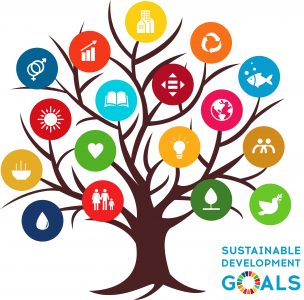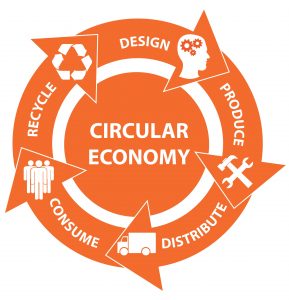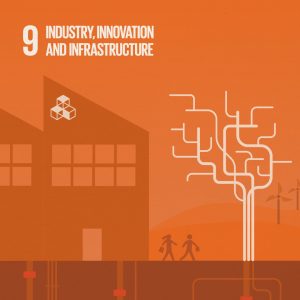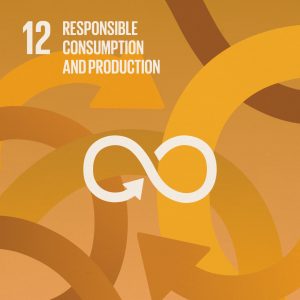United Nations Sustainable Development Goal (UNSDG) 12 is to “ensure sustainable consumption and production patterns.”
“Consumption and production drive the global economy, but also wreak havoc on planetary health through the unsustainable use of natural resources. The global material footprint is increasing faster than population growth and economic output.” – UNSDG 12

A colorful tree of the SDGs, with each SDG as a different branch.
Ever since China stopped taking the world’s plastic waste in 2017, we have been waking up to the reality that we have a serious plastic problem. A recent report from National Public Radio, How Big Oil Misled The Public Into Believing Plastic Would Be Recycled, told us that in the same way that oil companies knew decades ago about the potential for climate change and sought to hide this reality from consumers, they also knew that plastic recycling was a losing proposition and intentionally misled the public about it to keep their product’s image positive. Plastic production is increasing every year and plastics recycling technology and infrastructure is still critically lacking. Of the estimated 8,300 million metric tons of virgin plastics that have been produced to date, only around 9% of it has ever been recycled.
While discouraging articles and statistics come out regularly and it often seems as though the situation is hopeless, recycling still matters – A LOT. In the case of metals such as aluminum and steel, it is much more efficient to use recycled materials. They can effectively be recycled indefinitely, without a loss of quality. Aluminum has consistently shown the highest value among recycled commodities and remains in high demand. Paper and cardboard degrade as they are recycled, but paper can be recycled 5 to 7 times before the fibers break down too much to form traditional paper products.
Even for plastics, recycling still matters. It is especially important since plastic never fully degrades in our environment – over time it breaks up into smaller and smaller pieces called microplastics. These microplastics permeate our food systems and ecosystems. Recycling plastic is an incomplete process as it can often only be recycled once or twice into a new product. Often this will be something that does not have to carry food or meet stringent strength requirements, because the polymers break down in the recycling process. Recycling plastic can also be expensive compared to production with virgin material.
However imperfect, plastics recycling is still a stepping-stone to a better place, one where we think about materials in a more circular way, from a standpoint of continuous re-use. Entrepreneurs and innovators have come up with ways to recycle plastics into products including shoes, clothes, and composite lumber. One of the largest plastics recyclers in the country is located nearby in Troy, Alabama and one of their signature products is a plastic paint can made from 100% recycled plastic and a proprietary resin.
Creating demand for recycled products allows these processes to flourish and evolve. Things like clothing and lumber are not necessarily the ultimate solution, but they do create longer-lasting multi-use items from single-use products. We can also reduce our waste generation through prevention, reduction, reuse, and recycling.

An ilustration of circular economy
It is in our best interest to find solutions that ensure sustainable consumption and production patterns. We cannot reduce or recycle our way out of this. Our success depends on pursuing both those tracks while seeking new solutions at the same time. We continue to look for ways to reduce plastics on campus and to increase collection of and responsible handling for the plastic we are not yet able to avoid.
“A successful transition will mean improvements in resource efficiency, consideration of the entire life cycle of economic activities, and active engagement in multilateral environmental agreements.” – UNSDG 12
GET CONNECTED
Email: aureuse@auburn.edu
Website: auburn.edu/recycling
Twitter: @AU_Recycles
Instagram: @au_recycles
Facebook: auburnuniversityrecycles
Post contributed by Barbara Lengsfeld, Coordinator, Waste Reduction and Recycling Department, Facilities Management
Learn about the SDGs & AU and our contributions related to this post.






